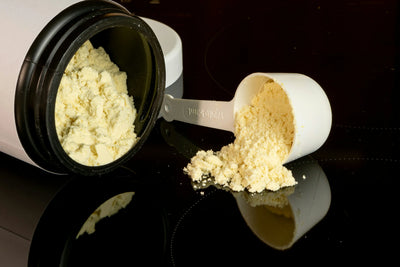Introduction

Understanding Allergies in Dogs
1.Common Types of Allergies in Dogs
(1)Food Allergies
Food allergies are triggered by specific ingredients in a dog's diet. Common allergens include chicken, beef, dairy, wheat, soy, and fish. Symptoms often manifest as gastrointestinal issues such as vomiting, diarrhea, and excessive gas, as well as skin problems like itching and ear infections. Food allergies can be diagnosed through an elimination diet, where a hypoallergenic diet is fed for 8 to 10 weeks, followed by the gradual reintroduction of different protein sources to identify the allergen.
(2)Environmental Allergies
Environmental allergies are caused by substances in the dog's surroundings. These include pollen, dust mites, mold spores, and airborne irritants. Symptoms typically involve itchy skin, sneezing, watery eyes, and paw licking. Seasonal allergies, often linked to pollen, can cause increased symptoms during specific times of the year. Environmental allergies can be diagnosed through blood tests or intradermal skin tests.
(3)Flea Allergies
Flea allergies are one of the most common types of allergies in dogs. A single flea bite can cause intense itching and redness, leading to hair loss and skin infections. Symptoms are often most severe around the base of the tail and groin. Regular flea prevention is essential to manage this type of allergy.
(4)Contact Allergies
Contact allergies occur when a dog's skin comes into direct contact with an allergen, such as cleaning products, certain fabrics, or topical medications. Symptoms include localized skin irritation and hair loss. Identifying and avoiding the allergen is key to managing contact allergies.
2.The Impact of Allergies on the Immune System
Allergies in dogs result from an overreaction of the immune system to otherwise harmless substances, known as allergens. When a dog is exposed to an allergen, the immune system produces antibodies that bind to mast cells. These cells release chemicals like histamine, causing inflammation, redness, swelling, and itching. This exaggerated immune response not only leads to discomfort but can also result in secondary infections if the skin is constantly scratched and broken.
3.Conventional Treatments and Their Drawbacks
Managing dog allergies often involves conventional treatments aimed at alleviating symptoms and controlling the immune response.
(1)Antihistamines
Antihistamines work by blocking the effects of histamine, reducing symptoms like itching and inflammation. Common antihistamines include Benadryl and Zyrtec. However, their effectiveness can vary, and they may not provide complete relief for all dogs.
(2)Steroids
Steroids offer rapid relief from inflammation and itching by suppressing the immune system. While they can be highly effective in the short term, long-term use can lead to negative side effects, such as weight gain, increased thirst and urination, and a weakened immune system. Therefore, they are typically used as a last resort or in combination with other treatments.
(3)Other Treatments
Other conventional treatments include Apoquel, a prescription medication that inhibits enzymes involved in the inflammatory process, and Cytopoint, an injectable therapy that provides long-lasting relief. Hypoallergenic diets and allergen immunotherapy are also used to manage food and environmental allergies. However, these treatments may not be suitable for all dogs, and their effectiveness can depend on the specific allergen and the dog's overall health.
In conclusion, understanding the different types of allergies in dogs, their impact on the immune system, and the available conventional treatments is essential for pet owners. While these treatments can provide relief, it is important to be aware of their potential drawbacks and work closely with a veterinarian to develop a comprehensive management plan for your dog's allergies.
What is Colostrum & How Does it Work?
1.Definition and Nutritional Composition of Colostrum
2.How Colostrum Supports Immune Function and Gut Health
(1)Immunoglobulins: Guardians of the Gut and Immune System
(2)Lactoferrin: A Multifaceted Ally for Gut Health
(3)Growth Factors: Nurturing the Gut for Optimal Function

3.Scientific Research on Colostrum's Benefits for Allergies and Inflammation
Recent scientific research has highlighted the potential benefits of colostrum for managing allergies and reducing inflammation. Studies have shown that colostrum can help prevent and reduce allergy symptoms through several mechanisms:
Immunoglobulins in colostrum can bind to allergens in the gut, preventing them from entering the bloodstream and triggering allergic reactions. Additionally, these antibodies help reduce gut inflammation by modulating pro-inflammatory cytokine production.
Proline-rich polypeptides (PRPs) in colostrum regulate the immune system by balancing the activity of T-helper cells. This helps reduce the production of IgE antibodies responsible for triggering allergic reactions.
Lactoferrin reduces inflammation in the gut and promotes a healthy gut microbiome, which is essential for maintaining a balanced immune response.
Growth factors in colostrum support the growth and repair of the gut lining, further reducing the risk of allergic reactions.
Clinical studies have demonstrated that colostrum supplementation can effectively reduce symptoms of allergies and inflammation. For example, a study published in the journal "Clinical Nutrition" found that colostrum reduced intestinal permeability and inflammation in patients with IBD. Another study showed that colostrum supplementation improved immune function and reduced the incidence of infections in individuals with weakened immune systems.
In conclusion, colostrum's rich composition of immunoglobulins, lactoferrin, and growth factors makes it a powerful natural supplement for enhancing immune function and promoting gut health. Scientific research supports its potential benefits for managing allergies and reducing inflammation, making it a valuable addition to a holistic approach to health and wellness.
Key Benefits of Colostrum for Dogs with Allergies
1.Immune Modulation
Colostrum is renowned for its ability to modulate the immune system, helping to balance immune responses and reduce allergic reactions. This is primarily due to its high concentration of immunoglobulins, particularly IgG, which are antibodies that play a crucial role in immune defense. When ingested, these immunoglobulins can survive digestion and bind to allergens in the gut, preventing them from entering the bloodstream and triggering an allergic response. Additionally, colostrum contains proline-rich polypeptides (PRPs) that help regulate the activity of T-helper cells, restoring balance between Th1 and Th2 cells. This balance is vital because an overactive Th2 response is often associated with increased production of IgE antibodies, which are responsible for allergic reactions.
2.Gut Health Support
Colostrum also significantly supports gut health by strengthening the gut barrier and reducing conditions like leaky gut syndrome. Leaky gut occurs when the intestinal lining becomes compromised, allowing undigested food particles and toxins to enter the bloodstream, which can trigger allergic reactions and inflammation. The growth factors present in colostrum, such as transforming growth factor-beta (TGF-β) and insulin-like growth factor-1 (IGF-1), promote the growth and repair of the gut lining. This helps maintain the integrity of tight junctions between gut cells, preventing harmful substances from leaking into the bloodstream. Furthermore, lactoferrin, another key component of colostrum, promotes a healthy gut microbiome by encouraging the growth of beneficial bacteria while inhibiting harmful pathogens.
3.Anti-Inflammatory Effects
The anti-inflammatory effects of colostrum are attributed to its rich content of bioactive compounds. These compounds help reduce symptoms associated with allergies, such as itching and swelling. Lactoferrin, for instance, has been shown to inhibit the production of pro-inflammatory cytokines, thereby reducing inflammation in the gut and throughout the body. This is particularly beneficial for individuals suffering from allergic reactions, as inflammation is a significant contributor to allergy symptoms. Additionally, colostrum's immunoglobulins can modulate the immune response by promoting the production of anti-inflammatory cytokines, which helps restore balance in the immune system.
4.Faster Healing
Colostrum is also known for its ability to promote faster healing of skin and tissue. The growth factors present in colostrum, such as IGF-1 and TGF-β, play a crucial role in tissue repair and regeneration. These factors stimulate the growth of new cells and enhance the healing process, making colostrum an effective supplement for individuals recovering from injuries or surgeries. Moreover, the anti-inflammatory properties of colostrum further support the healing process by reducing inflammation and pain associated with injuries.
In summary, colostrum offers a multifaceted approach to health by modulating the immune system, supporting gut health, reducing inflammation, and promoting faster healing. Its unique composition of immunoglobulins, lactoferrin, and growth factors makes it a powerful natural remedy for managing allergies and enhancing overall well-being. As research continues to uncover the benefits of colostrum, it is becoming increasingly recognized as a valuable addition to health and wellness regimens.
How to Use Colostrum for Dogs with Allergies
1.Forms of Colostrum Available
Colostrum supplements for dogs come in various forms, each designed to cater to different preferences and ease of administration. The most common forms include:
Powder: Colostrum powder is a versatile option that can be easily mixed with your dog's food or water. It ensures that the nutrients are evenly distributed and consumed by the dog. Powdered colostrum is rich in immunoglobulins, growth factors, and other essential nutrients.
Capsules: Capsules offer a convenient way to administer colostrum, especially for pet owners who prefer a more precise dosage. They are easy to handle and can be given directly to the dog or hidden in a small amount of food.
Chews and Treats: For dogs that enjoy treats, colostrum chews are an excellent choice. These chews are designed to be palatable and easy to administer while providing the same health benefits as powders and capsules. They are particularly useful for dogs that may be resistant to taking supplements in other forms.
2.Recommended Dosage Guidelines
The recommended dosage of colostrum for dogs depends on several factors, including the dog's weight and the severity of the condition being treated. Here are some general guidelines:
For general immune support: A typical starting dose for a dog weighing 10-20 kg (22-44 lbs) is about 1/4 to 1/2 teaspoon of colostrum powder per day. This can be adjusted based on the dog's response and overall health.
For specific conditions (e.g., allergies, digestive issues): Dogs with more severe conditions may require higher doses. For instance, a dog weighing 20-30 kg (44-66 lbs) might need 1/2 to 1 teaspoon of colostrum powder daily. It is important to consult with a veterinarian to determine the appropriate dosage based on the dog's specific needs.
3.Tips for Introducing Colostrum Gradually
Introducing colostrum into your dog's diet gradually is essential to avoid any digestive upset or adverse reactions. Here are some tips to help you get started:
Start with a small amount: Begin by giving your dog a small dose of colostrum, such as 1/8 teaspoon for smaller dogs or 1/4 teaspoon for larger dogs. This allows their digestive system to adjust to the new supplement.
Mix with food: If using colostrum powder, mix it with a small amount of your dog's regular food. This helps mask the taste and ensures that the colostrum is consumed. For capsules, you can open them and mix the contents with food as well.
Monitor for any reactions: Keep an eye on your dog for any signs of digestive upset, such as vomiting, diarrhea, or changes in appetite. If you notice any adverse reactions, reduce the dosage or consult your veterinarian.
Increase gradually: Over the course of a week or two, gradually increase the dosage to the recommended amount based on your dog's weight and condition. This slow introduction helps minimize the risk of digestive issues and ensures that your dog can tolerate the supplement well.
Be consistent: Once your dog is accustomed to the colostrum, maintain a consistent daily schedule to maximize its benefits. Consistency is key to supporting your dog's immune system and overall health.
In conclusion, colostrum supplements are available in various forms, including powder, capsules, and chews, making it easy to find a suitable option for your dog. By following the recommended dosage guidelines and introducing colostrum gradually, you can help support your dog's immune system, gut health, and overall well-being. Always consult with a veterinarian to ensure that colostrum is the right choice for your dog and to determine the appropriate dosage.
Choosing the Best Colostrum Supplement
1.Differences Between Bovine and Goat Colostrum
Bovine colostrum and goat colostrum are both rich in bioactive components that offer health benefits, but they have some key differences:
Lactose Content: Goat colostrum generally has lower lactose levels compared to bovine colostrum. This can make it a better option for individuals or pets with lactose intolerance.
Immunoglobulin Composition: Bovine colostrum is known for its higher concentration of immunoglobulins, particularly IgG. This makes it highly effective for immune support, which is a significant benefit for dogs with compromised immune systems.
Nutrient Profile: Bovine colostrum is richer in certain growth factors and proteins that support rapid growth and development. In contrast, goat colostrum may have a better ability to support the growth of beneficial gut bacteria, such as Bifidobacterium.
2.Factors to Consider When Choosing Colostrum
(1)Sourcing
Grass-Fed and Organic: Opt for colostrum sourced from grass-fed cows or goats raised under organic conditions. Grass-fed colostrum is richer in omega-3 fatty acids and antioxidants. Organic practices ensure that the colostrum is free from synthetic pesticides, hormones, and antibiotics.
Certification: Look for products certified by reputable organizations to ensure they meet high standards of purity and quality.
(2)Processing Methods
Low-Heat Processing: Choose colostrum that has been processed using low-heat methods. This helps preserve the integrity of bioactive components such as immunoglobulins and growth factors. High heat can denature these proteins, reducing their effectiveness.
(3)Purity and Added Ingredients
Pure Colostrum: Ensure the product contains only colostrum without fillers or artificial additives. Pure colostrum is more effective and safer for long-term use.
No Growth Hormones: Avoid products that contain growth hormones, as these can have negative health effects.
3.Trusted Brands and Vet-Recommended Products
Life’s First Naturals Colostrum Powder: This brand sources its colostrum from Grade A grass-fed cows and collects it within the first 24 hours after birth. It undergoes independent verification and in-house testing, ensuring high quality.
ARMRA Immune Revival Collagen: This product is collected within the first 24 hours and cold-processed to maintain the integrity of its immune-boosting components.
Heart & Soil Grass-Fed Colostrum: This brand emphasizes regenerative farming practices and offers a high-quality product free from hormones, antibiotics, and pesticides.
When choosing colostrum for your dog, consider the differences between bovine and goat colostrum, and prioritize factors such as sourcing, processing methods, and purity. Opting for trusted brands like Life’s First Naturals or ARMRA can ensure you provide your pet with a high-quality supplement that supports their immune system and overall health. Always consult with a veterinarian to determine the best choice for your dog's specific needs.
Potential Side Effects & Precautions
1.Possible Mild Side Effects
While colostrum is generally considered safe for dogs, some mild side effects may occur, particularly when first introducing the supplement:
Digestive Upset: Some dogs may experience gastrointestinal discomfort, such as vomiting, diarrhea, or constipation. This is often due to the introduction of new proteins and nutrients into the diet. To minimize this risk, start with a small dose and gradually increase it over a week or two.
Intolerance in Some Dogs: Dogs with sensitive stomachs or specific dietary intolerances may react to colostrum. If you notice any adverse reactions, such as excessive gas or changes in appetite, reduce the dosage or consult your veterinarian.
2.Contraindications
Certain dogs may not be suitable candidates for colostrum supplementation:
Dogs with Dairy Allergies: Since colostrum is derived from cow's milk or goat's milk, dogs with dairy allergies should avoid it. In such cases, alternative supplements or treatments should be considered.
Interactions with Certain Medications: Colostrum may interact with certain medications, particularly those that affect the immune system or gastrointestinal function. Always consult your veterinarian if your dog is on any medications to ensure there are no adverse interactions.
3.When to Consult a Vet Before Starting Colostrum Supplementation
It is crucial to consult a veterinarian before starting colostrum supplementation in the following situations:
Existing Health Conditions: If your dog has pre-existing health issues, such as gastrointestinal disorders, immune system disorders, or allergies, a veterinarian can provide personalized advice on whether colostrum is appropriate.
Medication Use: If your dog is currently taking any medications, a vet can assess the potential for interactions and recommend the best course of action.
Pregnant or Nursing Dogs: Pregnant or nursing dogs require special consideration, as colostrum may affect their health or the health of their puppies.
Senior Dogs: Older dogs may have unique health needs and may be more sensitive to new supplements. A vet can help determine if colostrum is suitable for your senior dog.
Colostrum can be a beneficial supplement for dogs, offering immune support, gut health benefits, and more. However, it is important to be aware of potential side effects and contraindications. Always consult with a veterinarian before starting your dog on any new supplement to ensure it is safe and appropriate for their specific needs.
Conclusion
Colostrum, often referred to as "nature's first food," is a rich source of immune-boosting nutrients that can provide significant relief for dogs suffering from allergies. Its unique composition includes immunoglobulins, lactoferrin, and growth factors, all of which work together to support a healthy immune response and reduce allergic symptoms. Here are the key benefits of colostrum for dogs with allergies:
Immune Modulation: Colostrum helps balance the immune system, reducing the overreaction to allergens that often leads to itching, inflammation, and other allergy symptoms. This is particularly beneficial for dogs with seasonal or environmental allergies.
Gut Health Support: By strengthening the gut barrier and promoting a healthy gut microbiome, colostrum can reduce the risk of leaky gut syndrome, which is a common trigger for allergies. A healthy gut is essential for overall well-being and can significantly improve your dog's quality of life.
 Anti-Inflammatory Effects: Colostrum contains bioactive compounds that help reduce inflammation, which is a major cause of discomfort in dogs with allergies. This can lead to less itching, swelling, and redness.
Anti-Inflammatory Effects: Colostrum contains bioactive compounds that help reduce inflammation, which is a major cause of discomfort in dogs with allergies. This can lead to less itching, swelling, and redness.
Faster Healing: The growth factors in colostrum promote skin and tissue repair, which is crucial for dogs with skin conditions caused by allergies. This can help your dog recover more quickly from any skin damage caused by excessive scratching or biting.
Conventional allergy treatments for dogs often involve the use of antihistamines, corticosteroids, or other medications that can have significant side effects. These treatments may provide temporary relief but can also weaken the immune system over time or cause other health issues. Colostrum, on the other hand, offers a natural and well-tolerated alternative that supports the body's natural defenses without the risk of harmful side effects. By addressing the root causes of allergies and promoting overall health, colostrum can be a game-changer for dogs suffering from chronic or severe allergic reactions.
When considering colostrum for your dog, it is essential to choose a high-quality product. Look for colostrum that is sourced from grass-fed, organic cows or goats, as these animals produce colostrum with higher levels of beneficial nutrients. Additionally, ensure that the colostrum is processed using low-heat methods to preserve its bioactive components. Avoid products with added fillers or artificial ingredients, as these can reduce the effectiveness of the supplement.
Before starting your dog on any new supplement, it is always a good idea to consult with your veterinarian. They can provide personalized advice based on your dog's specific health needs and ensure that colostrum is a suitable choice for your pet. Your vet can also help you determine the appropriate dosage and monitor your dog's progress to ensure the best possible outcomes.
Colostrum has the potential to transform the lives of dogs suffering from allergies, providing natural relief and supporting overall health. If you are considering this supplement for your dog, take the time to research high-quality products and consult with your veterinarian. Have you tried colostrum for your dog's allergies? Share your experience in the comments below! Your story could help other pet owners find a natural solution for their beloved companions.
Frequently Asked Questions
Q&A Section
Question 1: What is colostrum for dogs with allergies?
Answer: Colostrum is a nutrient-rich substance from mother’s milk, packed with immunoglobulins and growth factors that help support a dog’s immune system and reduce allergic reactions.
Question 2: How does colostrum help dogs with allergies?
Answer: Colostrum helps modulate the immune system, reducing inflammation and allergic responses. It also promotes gut health, which is crucial in managing food and environmental allergies.
Question 3: How do you give colostrum to a dog?
Answer: Colostrum is available in powder, capsule, or chew form. It can be mixed with food or given directly. Always follow dosage recommendations based on your dog’s weight.
Question 4: Are there any side effects of colostrum for dogs?
Answer: Most dogs tolerate colostrum well, but some may experience mild digestive upset. If your dog is lactose intolerant or has dairy allergies, consult your vet before use.
Question 5: How long does it take for colostrum to work on dog allergies?
Answer: Some dogs may show improvement within a few days, while others may take a few weeks. Consistent use is key to seeing long-term benefits for allergy relief.





